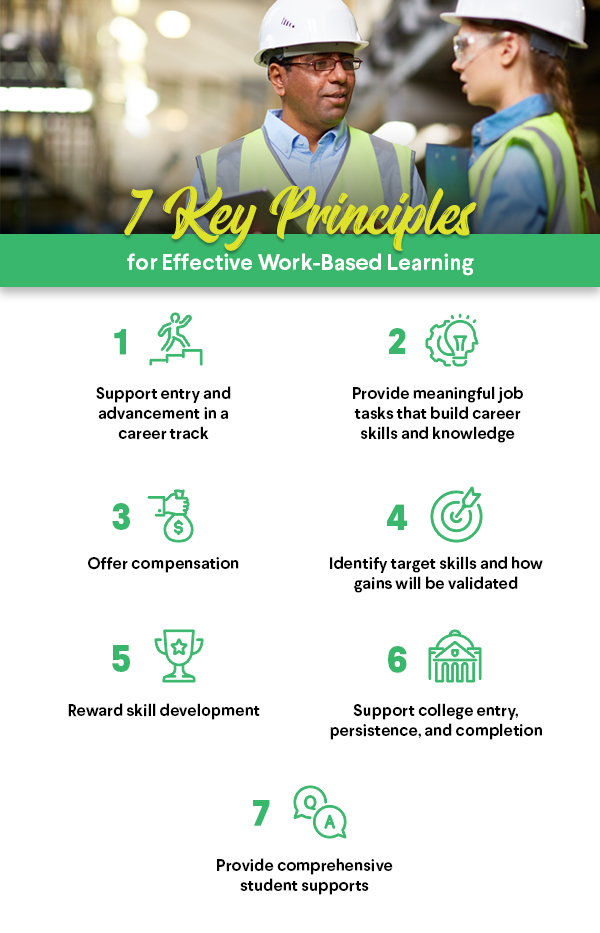
How to Develop an Effective Work-Based Learning Program
May 1, 2020
At A Glance
JFF has identified seven key principles for effective work-based learning models to ensure that work-based learning can fulfill its promise as a critical component of career pathways strategies designed to bolster education and employment outcomes.
Expanding access to work-based learning opportunities is a critical step toward improving the career prospects of low-income and low-skilled Americans. It would also help ensure that our economy has the highly skilled workforce it needs to thrive.
JFF has identified seven key principles for effective work-based learning models to ensure that work-based learning can fulfill its promise as a critical component of career pathways strategies designed to bolster education and employment outcomes. The overall goal of these principles is to strengthen the talent pipeline by increasing the number of individuals who successfully access and complete work-based learning programs, acquire skills and knowledge valued by employers, and enter and advance in careers.

1. Support entry and advancement in a career track
Effective models of work-based learning provide participants with opportunities to build knowledge, develop skills, and advance in specific career paths. Work-based learning supports the development of both industry-specific technical skills and professional skills—such as communication, teamwork, and problem-solving abilities—that are valued by nearly all employers.
2. Provide meaningful job tasks that build career skills and knowledge
Participants in work-based learning programs must have opportunities to engage in appropriately complex and relevant tasks aligned with their career goals. Moreover, work-based learning should include mentoring and supervision, and it should continue over a sustained period of time to give participants adequate opportunities to practice the skills they’re learning by performing meaningful job tasks.
3. Offer compensation
Compensating work-based learning participants honors their contributions and helps them remain focused and motivated. In addition, offering compensation is a way of making a program more accessible to a wider group of participants; people who need to earn money to support themselves wouldn’t be able to pursue these career-advancing opportunities if they had to work without pay.
4. Identify target skills and how gains will be validated
Work-based learning programs are more valuable to both students and employers when everyone has a clear understanding of the skills that participants are expected to attain, and when there are clear guidelines for verifying that participants have mastered those skills. Effective approaches to validating skills include reflective practices that lead to continuous learning and ensure integration with training goals, as well as formal assessments in which participants have an opportunity to demonstrate what they’ve learned.
5. Reward skill development
Effective work-based learning models reinforce learning by rewarding skills development through mechanisms such as increases in wages and benefits, high school or postsecondary credits, opportunities to transition to permanent employment, and promotions for incumbent workers.
6. Support college entry, persistence, and completion
Work-based learning programs should link to secondary and postsecondary coursework. They can promote educational persistence and completion because, in addition to often providing postsecondary credentials, they can reinforce classroom learning and provide students with needed financial support.
7. Provide comprehensive student supports
Effective work-based learning incorporates career navigation structures such as advising or coaching that equip students with the information they need to make informed choices about their careers. In addition, these programs should include supports to help students deal with circumstances that make it difficult for them to participate. For example, child care services could be made available for students who are parents.